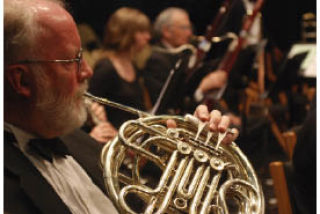German composer Richard Strauss once boasted that he could distinguish musically between a spoon and a fork.
“He recognized that he was doing storytelling purely in sound,” David Upham said.
Strauss, for the record, won’t be represented in Bainbridge Symphony Orchestra’s 2008-2009 season opener this weekend, under Upham’s direction. Instead, audiences will be treated to works by Beethoven, Ralph Vaughan Williams and Prokofiev, among others.
But the composer’s tongue-in-cheek assertion, Upham said, encapsulates the idea that without words, without images, every piece of orchestral music portrays an unmistakable narrative.
That idea is central to the three concerts presented by BSO this season, each of which explores a different storytelling genre through symphony. This weekend’s offerings are inspired by the work of William Shakespeare.
Upham considers two angles on how it is that a listener recognizes a piece of music as a story.
One variation on “how” is technical, probably having to do with response centers, our reptilian brains, and other neurological analytics that a symphony-goer probably isn’t interested in getting into during a moment of pure listening enjoyment.
“The first part is unanswerable, and it’s tied into the question why do we respond emotionally to sound in the first place…who knows why?” Upham said.
The second angle is of more interest to him, and it’s that angle that Strauss’ assertion got to the heart of.
“It really has to do with the fact that music, at least the tonal music we’re talking about here, is a system of expectation. By associating certain themes with music…you can set up a dialogue where those musical expectations are fulfilled, frustrated, (and) repeatedly fulfilled or frustrated, and by the end…you’re feeling the relief or the resolution of that collection of fulfilled expectations or frustrated expectations.
“That gets into the technical craft of what I do as a conductor. I sit down and look at the first bar, and ask myself, how will the audience respond to this?”
Ludwig van Beethoven’s Overture from Heinrich Joseph von Collin’s “Coriolanus,” which opens the concert, offers a prime example of a piece that through chords and themes aggressively conveys a beginning, middle, and an end – in the process milking those listener expectations.
The opening gesture portrays Roman general Coriolanus at his most powerful. The next softly and lyrically depicts the pleas of a wife and mother during war time. Then over the course of the overture, themes the listener has come to recognize are deconstructed, put back together, and re-fragmented, eventually working their way to the warrior’s demise.
“Beethoven’s brilliance in that overture is how he goes from one to the other and back, and how he tells the story at the end with the death of Coriolanus. It’s so vivid,” Upham said.
Other selections will include highlights from William Walton’s score of the 1944 Laurence Olivier film “Henry V,” along with “absolutely lush and rich and gorgeous” orchestral version of Williams’ “Serenade to Music,” which was originally set for both voices and orchestra – the vocal narration coming from “The Merchant of Venice.”
The program closes with selections from Prokofiev’s ballet score “Romeo and Juliet.” Upham said this “homemade suite” will convey a variety of moods from the ballet, and will be accompanied by a projection screen providing the title of each scene and lines of dialogue from the original play.
Looking ahead to more musical storytelling this year, “Fables and Fairy Tales” will encourage family symphony-going in March, followed by “Film Through the Ages” in May.
As to the choice of Shakespeare for the fall, Upham said the idea had been rattling around in the back of his head for some time. When he heard that BPA was staging “Macbeth” in October – not to mention BPA Theatre School’s recent production of “Saving Juliet” – he called it a “happy, serendipitous coincidence.”
“How great is that?” he said.



